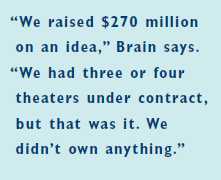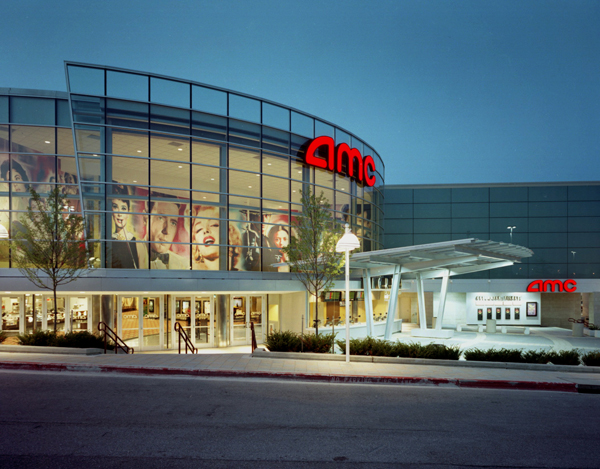When David M. Brain (A&S ’78, MBA ’79) was about to graduate from Tulane, the placement office asked him to fill out a form stating his career objective. Brain thought for a minute and then wrote, “To never wear socks again.”
“If you never have to wear socks, two things are true,” Brain says. “One, you never have to impress people, and, two, you live in a warm climate.”
Brain ended up marrying a girl from Iowa that he met in Kansas City, so he set aside his dreams of a subtropical existence in exchange for domestic harmony, but today—as the head of one of America’s top specialty real estate investment trusts— Brain can proudly say he wears socks only when he feels like it.
Brain is the founder, president and CEO of EPR Properties, which owns nearly 200 primarily entertainment-related properties in the U.S. and Canada, including 117 “megaplex” movie theaters. With a market cap of $3.75 billion, EPR ranks as one of the nation’s top 50 REITs, but the company might never have existed had Brain not attended a fateful breakfast meeting 16 years ago.
At the time, Brain was a senior vice president at George K. Baum & Co., a regional investment banking firm headquartered in Kansas City. The firm’s research department was hoping to initiate coverage of AMC Entertainment Inc., the Kansas City-based movie theater operator, so it sent out a memo asking if anyone at the firm had connections at AMC. Brain, it turned out, had gone to high school with AMC’s chief financial officer, so he called up his former classmate and set up a breakfast meeting to introduce the firm’s analysts to members of AMC’s management team.
AMC had pioneered the multiscreen movie theater in the early 1960s, and in the mid-1990s, the company was poised to revolutionize the movie-going experience yet again. AMC had recently unveiled the Grand 24, the first megaplex movie theater in North America. Located in Dallas, the 24-screen cinema featured stadium-style seating, enhanced concessions and enough screens to show all the top Hollywood releases in one convenient location. The Grand was a huge hit with moviegoers, tripling AMC’s pro forma projections from the get-go, but the company’s executives told Brain they were still having a hard time convincing landlords across the country to invest the $20 million necessary to build the new state-of-the-art theaters.
Brain had previously worked with a number of REITs to help his investment banking clients with their real estate development needs, so he offered to help AMC find a specialty REIT that could build the new theaters for them.
 “Nobody would even talk to me,” Brain says. “People generally like things with precedent, but no one had ever done this before. It was really frustrating.”
“Nobody would even talk to me,” Brain says. “People generally like things with precedent, but no one had ever done this before. It was really frustrating.”
Then Brain had another thought. If no REIT was willing to take a chance on AMC, why not start his own REIT to finance the new theaters? Brain asked AMC for a six-month contract to get the idea off the ground. He wrote up a business plan, shopped it around to Wall Street, and in November 1997, Entertainment Properties Trust, as the company was originally called, launched its IPO. To borrow a term from the movie business, it was a blockbuster.
“We raised $270 million on an idea,” Brain says. “We had three or four theaters under contract, but that was it. We didn’t own anything.”
Today, 15 years later, EPR’s portfolio has grown to 182 properties with a total value of more than $3.25 billion. The company’s holdings include megaplex theaters, entertainment retail centers, family entertainment centers, ski parks, golf entertainment complexes, water parks and even public charter schools, a growing business area for the company, but Brain says movie theaters are likely to remain the company’s bread and butter for a long, long time.
“The reality of the business is people go to the movies year in and year out,” Brain says. “Over 15 years, we have never missed a month of rent. If you want to make a 12 percent return on a very steady, reliable, asset-backed basis, that’s what we’re all about.”



